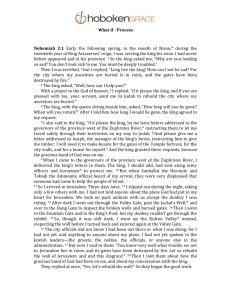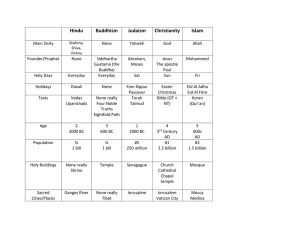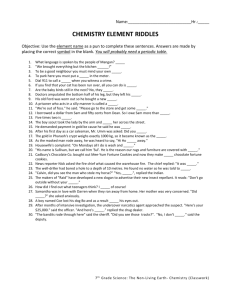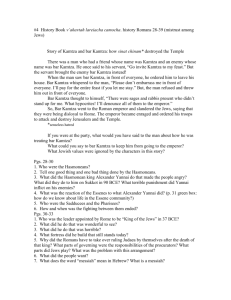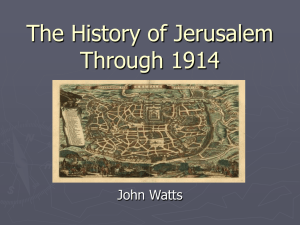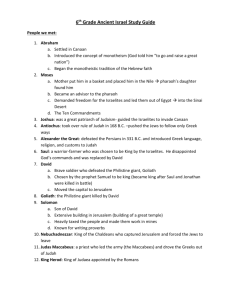Babylonian Talmud: Tractate Gittin 55b
advertisement
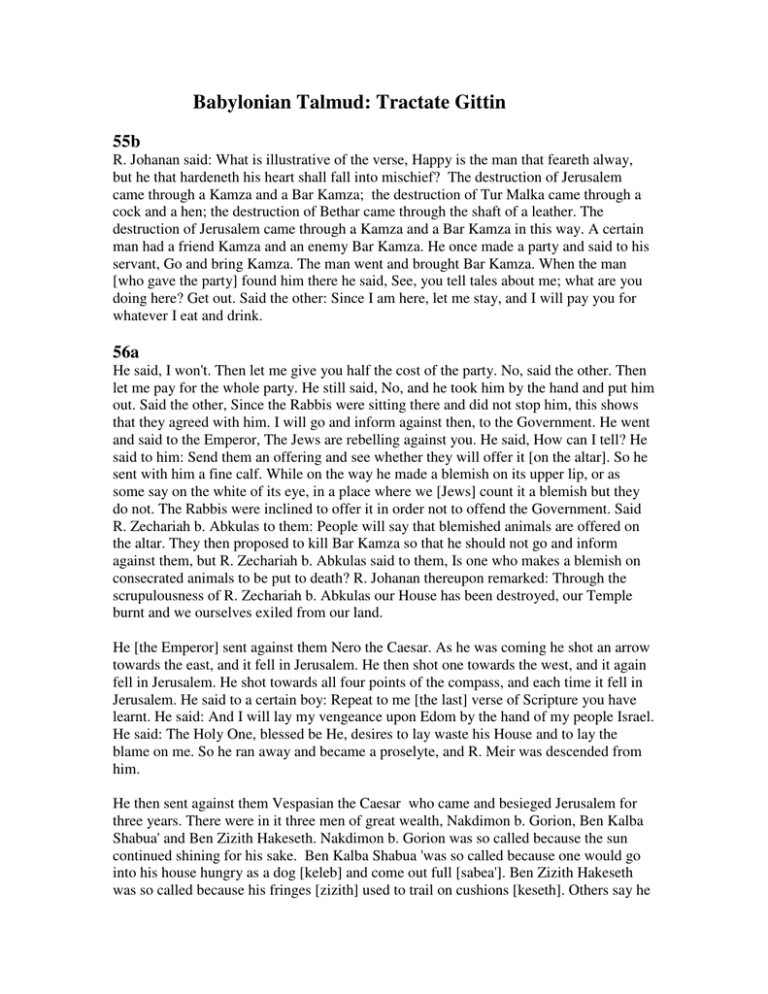
Babylonian Talmud: Tractate Gittin 55b R. Johanan said: What is illustrative of the verse, Happy is the man that feareth alway, but he that hardeneth his heart shall fall into mischief? The destruction of Jerusalem came through a Kamza and a Bar Kamza; the destruction of Tur Malka came through a cock and a hen; the destruction of Bethar came through the shaft of a leather. The destruction of Jerusalem came through a Kamza and a Bar Kamza in this way. A certain man had a friend Kamza and an enemy Bar Kamza. He once made a party and said to his servant, Go and bring Kamza. The man went and brought Bar Kamza. When the man [who gave the party] found him there he said, See, you tell tales about me; what are you doing here? Get out. Said the other: Since I am here, let me stay, and I will pay you for whatever I eat and drink. 56a He said, I won't. Then let me give you half the cost of the party. No, said the other. Then let me pay for the whole party. He still said, No, and he took him by the hand and put him out. Said the other, Since the Rabbis were sitting there and did not stop him, this shows that they agreed with him. I will go and inform against then, to the Government. He went and said to the Emperor, The Jews are rebelling against you. He said, How can I tell? He said to him: Send them an offering and see whether they will offer it [on the altar]. So he sent with him a fine calf. While on the way he made a blemish on its upper lip, or as some say on the white of its eye, in a place where we [Jews] count it a blemish but they do not. The Rabbis were inclined to offer it in order not to offend the Government. Said R. Zechariah b. Abkulas to them: People will say that blemished animals are offered on the altar. They then proposed to kill Bar Kamza so that he should not go and inform against them, but R. Zechariah b. Abkulas said to them, Is one who makes a blemish on consecrated animals to be put to death? R. Johanan thereupon remarked: Through the scrupulousness of R. Zechariah b. Abkulas our House has been destroyed, our Temple burnt and we ourselves exiled from our land. He [the Emperor] sent against them Nero the Caesar. As he was coming he shot an arrow towards the east, and it fell in Jerusalem. He then shot one towards the west, and it again fell in Jerusalem. He shot towards all four points of the compass, and each time it fell in Jerusalem. He said to a certain boy: Repeat to me [the last] verse of Scripture you have learnt. He said: And I will lay my vengeance upon Edom by the hand of my people Israel. He said: The Holy One, blessed be He, desires to lay waste his House and to lay the blame on me. So he ran away and became a proselyte, and R. Meir was descended from him. He then sent against them Vespasian the Caesar who came and besieged Jerusalem for three years. There were in it three men of great wealth, Nakdimon b. Gorion, Ben Kalba Shabua' and Ben Zizith Hakeseth. Nakdimon b. Gorion was so called because the sun continued shining for his sake. Ben Kalba Shabua 'was so called because one would go into his house hungry as a dog [keleb] and come out full [sabea']. Ben Zizith Hakeseth was so called because his fringes [zizith] used to trail on cushions [keseth]. Others say he derived the name from the fact that his seat [kise] was among those of the nobility of Rome. One of these said to the people of Jerusalem, I will keep them in wheat and barley. A second said, I will keep them in wine, oil and salt. The third said, I will keep them in wood. The Rabbis considered the offer of wood the most generous, since R. Hisda used to hand all his keys to his servant save that of the wood, for R. Hisda used to say, A storehouse of wheat requires sixty stores of wood [for fuel]. These men were in a position to keep the city for twenty-one years. The biryoni were then in the city. The Rabbis said to them: Let us go out and make peace with them [the Romans]. They would not let them, but on the contrary said, Let us go out and fight them. The Rabbis said: You will not succeed. They then rose up and burnt the stores of wheat and barley so that a famine ensued. Martha the daughter of Boethius was one of the richest women in Jerusalem. She sent her man-servant out saying, Go and bring me some fine flour. By the time he went it was sold out. He came and told her, There is no fine flour, but there is white [flour]. She then said to him, Go and bring me some. By the time he went he found the white flour sold out. He came and told her, There is no white flour but there is dark flour. She said to him, Go and bring me some. By the time he went it was sold out. He returned and said to her, There is no dark flour, but there is barley flour. She said, Go and bring me some. By the time he went this was also sold out. She had taken off her shoes, but she said, I will go out and see if I can find anything to eat. Some dung stuck to her foot and she died. Rabban Johanan b. Zakkai applied to her the verse, The tender and delicate woman among you which would not adventure to set the sole of her foot upon the ground. Some report that she ate a fig left by R. Zadok, and became sick and died. For R. Zadok observed fasts for forty years in order that Jerusalem might not be destroyed, [and he became so thin that] when he ate anything the food could be seen [as it passed through his throat.] When he wanted to restore himself, they used to bring him a fig, and he used to suck the juice and throw the rest away. When Martha was about to die, she brought out all her gold and silver and threw it in the street, saying, What is the good of this to me, thus giving effect to the verse, They shall cast their silver in the streets. Abba Sikra the head of the biryoni in Jerusalem was the son of the sister of Rabban Johanan b. Zakkai. [The latter] sent to him saying, Come to visit me privately. When he came he said to him, How long are you going to carry on in this way and kill all the people with starvation? He replied: What can I do? If I say a word to them, they will kill me. He said: Devise some plan for me to escape. Perhaps I shall be able to save a little. He said to him: Pretend to be ill, and let everyone come to inquire about you. Bring something evil smelling and put it by you so that they will say you are dead. Let then your disciples get under your bed, but no others, so that they shall not notice that you are still light, since they know that a living being is lighter than a corpse. He did so, and R. Eliezer went under the bier from one side and R. Joshua from the other. When they reached the door, some men wanted to put a lance through the bier. He said to them: Shall [the Romans] say. They have pierced their Master? They wanted to give it a push. He said to them: Shall they say that they pushed their Master? They opened a town gate for him and he got out. When he reached the Romans he said, Peace to you, O king, peace to you, O king. He [Vespasian] said: Your life is forfeit on two counts, one because I am not a king and you call me king, and again, if I am a king, why did you not come to me before now? He replied: As for your saying that you are not a king, 56b in truth you are a king, since if you were not a king Jerusalem would not be delivered into your hand, as it is written, And Lebanon shall fall by a mighty one. 'Mighty one' [is an epithet] applied only to a king, as it is written, And their mighty one shall be of themselves etc.; and Lebanon refers to the Sanctuary, as it says, This goodly mountain and Lebanon. As for your question, why if you are a king, I did not come to you till now, the answer is that the biryoni among us did not let me. He said to him; If there is a jar of honey round which a serpent is wound, would they not break the jar to get rid of the serpent? He could give no answer. R. Joseph, or as some say R. Akiba, applied to him the verse, [God] turneth wise men backward and maketh their knowledge foolish. He ought to have said to him: We take a pair of tongs and grip the snake and kill it, and leave the jar intact. At this point a messenger came to him from Rome saying, Up, for the Emperor is dead, and the notables of Rome have decided to make you head [of the State]. He had just finished putting on one boot. When he tried to put on the other he could not. He tried to take off the first but it would not come off. He said: What is the meaning of this? R. Johanan said to him: Do not worry: the good news has done it, as it says, Good tidings make the bone fat.7 What is the remedy? Let someone whom you dislike come and pass before you, as it is written, A broken spirit drieth up the bones. He did so, and the boot went on. He said to him: Seeing that you are so wise, why did you not come to me till now? He said: Have I not told you? — He retorted: I too have told you. He said; I am now going, and will send someone to take my place. You can, however, make a request of me and I will grant it. He said to him: Give me Jabneh and its Wise Men, and the family chain of Rabban Gamaliel, and physicians to heal R. Zadok. R. Joseph, or some say R. Akiba, applied to him the verse, '[God] turneth wise men backward and maketh their knowledge foolish'. He ought to have said to him; Let them [the Jews] off this time. He, however, thought that so much he would not grant, and so even a little would not be saved. How did the physicians heal R. Zadok? The first day they let him drink water in which bran had been soaked; on the next day water in which there had been coarse meal; on the next day water in which there had been flour, so that his stomach expanded little by little. Vespasian sent Titus who said, Where is their God, the rock in whom they trusted? This was the wicked Titus who blasphemed and insulted Heaven. What did he do? He took a harlot by the hand and entered the Holy of Holies and spread out a scroll of the Law and committed a sin on it. He then took a sword and slashed the curtain. Miraculously blood spurted out, and he thought that he had slain himself, as it says, Thine adversaries have roared in the midst of thine assembly, they have set up their ensigns for signs. Abba Hanan said: Who is a mighty one like unto thee, O Jah? Who is like Thee, mighty in self-restraint, that Thou didst hear the blaspheming and insults of that wicked man and keep silent? In the school of R. Ishmael it was taught; Who is like thee among the gods [elim]? Who is like thee among the dumb ones [illemim]. Titus further took the curtain and shaped it like a basket and brought all the vessels of the Sanctuary and put them in it, and then put them on board ship to go and triumph with them in his city, as it says, And withal I saw the wicked buried, and they that come to the grave and they that had done right went away from the holy place and were forgotten in the city. Read not keburim [buried] but kebuzim [collected]; read not veyishtakehu [and were forgotten] but veyishtabehu [and triumphed]. Some say that keburim [can be retained], because even things that were buried were disclosed to them. A gale sprang up at sea which threatened to wreck him. He said: Apparently the power of the God of these people is only over water. When Pharaoh came He drowned him in water, when Sisera came He drowned him in water. He is also trying to drown me in water. If he is really mighty, let him come up on the dry land and fight with me. A voice went forth from heaven saying; Sinner, son of sinner, descendant of Esau the sinner, I have a tiny creature in my world called a gnat. (Why is it called a tiny creature? Because it has an orifice for taking in but not for excreting.) Go up on the dry land and make war with it. When he landed the gnat came and entered his nose, and it knocked against his brain for seven years. One day as he was passing a blacksmith's it heard the noise of the hammer and stopped. He said; I see there is a remedy. So every day they brought a blacksmith who hammered before him. If he was a non-Jew they gave him four zuz, if he was a Jew they said, It is enough that you see the suffering of your enemy. This went on for thirty days, but then the creature got used to it. It has been taught: R. Phineas b. 'Aruba said; I was in company with the notables of Rome, and when he died they split open his skull and found there something like a sparrow two sela's in weight. A Tanna taught; Like a young dove two pounds in weight. Abaye said; We have it on record that its beak was of brass and its claws of iron. When he died he said: Burn me and scatter my ashes over the seven seas so that the God of the Jews should not find me and bring me to trial. Onkelos son of Kolonikos was the son of Titus's sister. He had a mind to convert himself to Judaism. He went and raised Titus from the dead by magical arts, and asked him; 'Who is most in repute in the [other] world? He replied: Israel. What then, he said, about joining them? He said: Their observances are burdensome and you will not be able to carry them out. Go and attack them in that world and you will be at the top as it is written, Her adversaries are become the head etc.; whoever harasses Israel becomes head. He asked him: 57a What is your punishment [in the other world]? He replied: What I decreed for myself. Every day my ashes are collected and sentence is passed on me and I am burnt and my ashes are scattered over the seven seas. He then went and raised Balaam by incantations. He asked him: Who is in repute in the other world? He replied: Israel. What then, he said, about joining them? He replied: Thou shalt not seek their peace nor their prosperity all thy days for ever. He then asked: What is your punishment? He replied: With boiling hot semen. He then went and raised by incantations the sinners of Israel. He asked them: Who is in repute in the other world? They replied: Israel. What about joining them? They replied: Seek their welfare, seek not their harm. Whoever touches them touches the apple of his eye. He said: What is your punishment? They replied: With boiling hot excrement, since a Master has said: Whoever mocks at the words of the Sages is punished with boiling hot excrement. Observe the difference between the sinners of Israel and the prophets of the other nations who worship idols. It has been taught: Note from this incident how serious a thing it is to put a man to shame, for God espoused the cause of Bar Kamza and destroyed His House and burnt His Temple. 'Through a cock and a hen Tur Malka was destroyed'. How? — It was the custom that when a bride and bridegroom were being escorted a cock and a hen were carried before them, as if to say, Be fruitful and multiply like fowls. One day a band of Roman soldiers passed by and took the animals from them, so the Jews fell on them and beat them. So they went and reported to the Emperor that the Jews were rebelling, and he marched against them. There came against them one Bar Daroma who was able to jump a mile, and slaughtered them. The Emperor took his crown and placed it on the ground, saying, Sovereign of all the world, may it please thee not to deliver me and my kingdom into the hands of one man. Bar Daroma was tripped up by his own utterance, as he said, Hast not thou, O God, cast us off and thou goest not forth, O God, with our hosts. But David also said thus? — David wondered if it could be so. He went into a privy and a snake came, and he dropped his gut [from fright] and died. The Emperor said: Since a miracle has been wrought for me, I will let them off this time. So he left them alone and went away. They began to dance about and eat and drink and they lit so many lamps that the impress of a seal could be discerned by their light a mile away from the place. Said the Emperor; Are the Jews making merry over me? And he again invaded them. R. Assi said; Three hundred thousand men with drawn swords went in to Tur Malka, and slaughtered for three days and three nights, while on the other side dancing and feasting was going on, and one did not know about the other. The Lord hath swallowed up all the habitations of Jacob and hath not pitied. When Rabin came he said in the name of R. Johanan; These are the sixty thousand myriads of cities which King Jannai had in the King's Mountain. For R. Judah said in the name of R. Assi: King Jannai had sixty myriads of cities in the King's Mountain, and in each of them was a population as large as that of the Exodus, save in three of them which had double as many. These were Kefar Bish, Kefar Shihlayim, and Kefar Dikraya. [The first was called] Kefar Bish [evil village] because they never gave hospitality to visitors. The second was called Kefar Shihlayim because they made their living from shihlayim [watercress]. Kefar Dikraya [village of males] according to R. Johanan, was so called because women used to bear males first and finally a girl and then no more.
